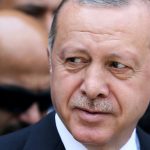On June 6, then-Acting Secretary of Defense Patrick Shanahan sent a strongly-worded letter to his Turkish counterpart over Turkey’s planned purchase of S-400 air defense system from Russia. The letter outlined a timeline to remove Turkey from the F-35 fighter jet program, should Turkey move forward with the purchase. Washington argues that if installed in Turkey, the S-400 system will compromise the F-35 technology.
Turkish President Recep Tayyip Erdoğan chafed at threats of sanctions and said that the S-400 purchase is a done deal. And indeed, last week Russia began delivering the system to Turkey,
As U.S.-Turkey relations are headed for further downturn, Erdoğan appears to have pinned his hope on President Trump in order to avoid U.S. sanctions. In fact, Erdoğan came out of his meeting with Trump on the sidelines of the G-20 Summit in Japan at the end of June satisfied, as Trump put the blame for the S-400 crisis on Obama administration and—in contrast to the messages from elsewhere in the U.S. government—gave the impression that he doesn’t favor putting heavy sanctions on Turkey over the issue.
It is, nevertheless, perplexing to observe how Russia is reshaping U.S.-Turkey relations.
A NEW CHAPTER
It was the Soviet threat that gave birth to the U.S.-Turkey alliance. Through economic and military aid, President Harry Truman tried to prevent Turkey and Greece from falling under Soviet influence in 1947. With a twist of irony, it is now Russia that may break this alliance.
As the purchase of S-400 missile system illustrates, there has been an important change in tide, both in U.S.-Turkish and in Turkish-Russian relations.
Defying expectations, Turkey and Russia have fast deepened relations on multiple fronts in recent years. Syria was a magnet that Russia used to lure in Turkey. What started as a pragmatic engagement between the sides within the context of the Syrian crisis has already gone beyond Syria. Few predicted that Turkish-Russian courting could survive Syria’s ever-complicated crisis. Yet thus far, the relationship has survived and even further improved.
Such negative expectations for the future of Turkish-Russian relations were not baseless. Geopolitically, the two countries are on opposite sides of the spectrum on almost all issues in their shared neighborhood. Likewise, both countries’ local and regional alliance structures remain at cross-purposes. Recognition of Russia’s geopolitical ambitions, particularly towards the Eastern Mediterranean, was one of the major factors that drove Turkey to seek membership in different Western clubs.
WARMING TIES BETWEEN ANKARA AND MOSCOW
So why is Turkey now seeking to form a partnership with Russia?
Russia’s military involvement in the Syrian crisis and Turkey’s subsequent shooting down of a Russian jet in the fall of 2015 were the crucial turning points. With the former, the regime-change scenario in Damascus has further faded from the horizon; with the latter, Turkey was effectively pushed out of the Syrian scene. By then, the West had already given up on the regime change in Syria, and the Kurdistan Worker’s Party (PKK)-affiliated Syrian Kurdish People’s Protection Units (YPG) was fast gaining territorial control and political influence in Syria. In response, Turkey also set aside its regime-change goal, mended relations with Russia, and focused on curtailing Syrian Kurdish gains instead. This bet paid off. With Russian approval, Turkey undertook military operations in northwestern Syria, driving YPG forces east of the Euphrates river.
Yet such pragmatism wasn’t the only factor that has shaped the Turkish-Russian engagement since then. The U.S. is the invisible third party that shapes its trajectory.
Divergence and decoupling have been the dominant forces of U.S.-Turkey relations in recent years. Putting aside diplomatic courtesy, officials from both sides have thrown accusations and threats at each other. Turkey reprimands the U.S. for supporting the Syrian Democratic Forces, and the U.S. is increasingly vocal in its criticism of Turkey’s relations with Russia and Iran, as well as Ankara’s policy towards Syria. The name of the U.S. sanction that Turkey is facing as a result of the S-400 purchase—Countering America’s Adversaries Through Sanctions Act (CATSAA)—is telling. The level of trust between the two sides is at a historical low. Institutional ties are fraying, particularly at the military-to-military level. The Turkish public, political elites, and policymakers increasingly view the United States Central Command (CENTCOM) as a menacing force.
In April, Vice President Mike Pence asked Turkey to make a choice between NATO and Russia. Preferring strategic autonomy in both foreign and security policy, Turkey doesn’t want to make such a choice. It explores ways to reconcile its NATO membership and historical ties to the West with its improving relations with countries such as Russia, China, and Iran.
It isn’t just that Turkey believes that the U.S. isn’t very receptive to its interests: Turkey also thinks U.S. policy toward the Eastern Mediterranean directly undermines Ankara’s regional role. The Senate’s adoption of the “Eastern Mediterranean Security and Partnership Act” further aggravates Turkey’s fears that U.S. policy in the region, whether by design or by accident, culminates in a hard containment of Iran and soft containment of Turkey. Traditionally, Turkey was in fact one of the linchpins of U.S. policy towards Eastern Mediterranean. But this bill advocates lifting the arms embargo on Cyprus (first instated in 1987) and envisages Greece, Cyprus, and Israel as the new linchpins of U.S. policy towards the region. In this regard, Secretary of State Mike Pompeo’s attendance at the Israeli-Cypriot-Greek tripartite meeting on energy and security in the Eastern Mediterranean in Israel in March further contributes to Turkey’s fears. This and similar initiatives will further convince Turkish decisionmakers that the U.S. is pursuing a double containment strategy of Iran and Turkey. Not only will this make Turkey less cooperative towards any U.S. policy on Iran, but it will also further motivate Turkey to work even more closely with Russia and Iran.
CAN THE U.S.-TURKEY FRIENDSHIP BE REKINDLED?
Turkey’s newly found partnership with Russia is still fragile and evolving. The Russian-backed Syrian regime’s recent offensive on Idlib province in Syria glaringly illustrated the limits of Russian-Turkish cooperation in the Middle East and beyond.
Their relationship is no match for Turkey’s historical and institutional ties to the West. Yet these ties are fraying. A heavy set of U.S. sanctions on Turkey in response to Turkey’s purchase of the S-400 missile system may have the unintended consequence of making Turkey even more dependent on Russia. In this scenario, this deal will further turn into a choice of geopolitical realignment for Turkey, away from the West and closer to Russia. And peeling Turkey further away from the West and undermining NATO are precisely what Russia covets. Such a realignment will make Turkey even more introverted and democratically retrograde, and serve neither Turkish nor Western interests. This is the prospect that Turkish and American officials should prevent at all cost.
By Galip Dalay
Source: Brookings



